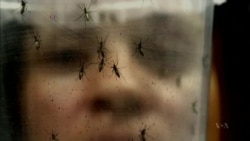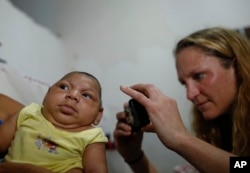Scientists are making new discoveries about the Zika virus almost daily, and the more they learn, the more frightening the virus becomes.
Dr. Tom Frieden, director of the Centers for Disease Control and Prevention, said Thursday that "there is nothing about Zika control that is quick or easy. The only only thing quick is the mosquito bite that can give it to you."
Since the World Health Organization declared the Zika virus a public health emergency, scientists have linked it to paralysis and brain infections in adults, but the virus has saved its most horrifying outcome for developing fetuses.
A study at Johns Hopkins Medicine in Baltimore showed that Zika infects and kills the very cells that form the developing brain.
Another study, this one at the University of California-Los Angeles in conjunction with researchers at the Fiocruz Institute in Brazil, "found a strong link between Zika and adverse pregnancy outcomes, which haven’t been documented before,” according to Dr. Karin Nielsen, the senior author of the study at the UCLA School of Medicine.
Nielsen was quoted in a university press release as saying, “We saw problems with the fetus or the pregnancy at eight weeks, 22 weeks, 25 weeks, and we saw problems at 35 weeks. Even if the fetus isn’t affected, the virus appears to damage the placenta, which can lead to fetal death."
High attack rate
This study showed abnormalities in 29 percent of the fetuses of women who tested positive for the Zika virus and who had ultrasound examinations. Dr. Anthony Fauci, head of the National Institutes of Allergy and Infectious Diseases at the National Institutes of Health, told VOA this high attack rate is very concerning.
"We're almost certain that there are going to be lesser degrees or more subtle abnormalities that may not be picked up on Doppler ultrasound, so I think that the actual incidence of deleterious effects on the fetus is going to be considerably higher than just 29 percent," Fauci said.
"These abnormalities could affect even babies who at first appear normal, including problems with vision, hearing, heart function and a host of other things not related to microcephaly," he said.
Fauci's advice offers little hope, especially for poor women in Latin America and the Caribbean. "Don't get infected," he said, "Get a vaccine to prevent infection. That’s the best way to do it."
Of course, right now, there is no vaccine. And even though work is progressing rapidly, it will be two to three years before one might be available.
"Then you do vector control, mosquito control to prevent people from getting infected," Fauci said.
No funds from Congress
Another issue is money. Congress has not yet provided additional funds to continue the research or to advance the work of the CDC to protect U.S. citizens as the virus makes its way north.
Frieden recently visited Puerto Rico, a U.S. territory. He said he expected hundreds of thousands of people on the island to be infected by year's end, including thousands of pregnant women.
The lack of funds, Frieden said, is interfering with the CDC's ability to "mount a robust response and interfering with our ability to keep Americans from other threats." To fund the Zika program, the CDC has reallocated money from other programs.
At that news conference, which Fauci also attended, he said the NIH had shifted funds from research on a vaccine against HIV and other areas to the work on Zika, but he warned that if funds weren't approved, even work on a Zika vaccine would slow down.







